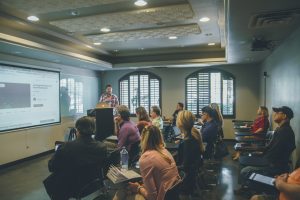Educating the Next PR Generation
Published on October 4, 2019, at 2:00 p.m.
by Zoie Mestayer.

These days, public relations educators have their work cut out for them. Clients demand creative, flexible and experienced employees — a tall order, to say the least. PR professors are wholly responsible for creating this next generation of public relations practitioners to suit the ever-changing needs of a diverse industry. Behind every successful public relations professional, there’s a number of professors who helped them get there.
That said, there is no clearly defined path to becoming a PR educator. A commonly held misconception is that you need to get a doctorate to teach at a university, but that’s not the case. Some institutions require a master’s degree, but the requirements are otherwise flexible. Aspiring professors often do follow the traditional academic route and pursue a doctoral degree, conducting research along the way. However, there is also a place for experienced professionals in higher education, even if they have never considered academia an option.
Mark Harris, a visiting professor at The University of Alabama, is a perfect example of the latter; his teaching job was somewhat of a happy accident. He had just retired from IBM, where he served as the vice president of communications for IBM Global Business Services. He had planned to do some freelance work, but mainly relax, during his retirement. He was a board member of The Plank Center for Leadership in Public Relations, which is headquartered on UA’s campus, and was contacted by the head of the university’s advertising and public relations department about filling a recent opening on the faculty.
Now, Harris is beginning his third year of teaching. He attributes much of his approach in the classroom to his experience in the industry. He knows what matters to employers because, until very recently, he was the employer. Imparting these skills is essential to teaching the next generation of public relations professionals to make the move from the campus to the workplace. For example, in his leadership class, he tries to “de-mystify what the professional world is all about — the standards and expectations” and focus on skills that he knows will get them hired, like critical thinking, building persuasive arguments and public speaking. He wants his students to feel prepared and confident to enter any work environment when they leave his class.
“I don’t have the expertise of people doing cutting-edge research on trends and developments in communications,” Harris said. “Exposure to that expertise is essential. At the same time, I think what we offer here is a balance of that kind of scholarship along with the perspective of very recent, working experience in the profession.”
Dr. Christal Johnson, assistant teaching professor at Syracuse University, agreed that on-the-job experience is helpful for any educator. She maintains, however, the benefits of pursuing graduate degrees in public relations — both for aspiring educators and future PR practitioners. She began teaching communications and writing courses at a community college after being laid off as a result of downsizing. Later, she went back to school, got her doctorate and began working at a four-year university.
“Pursuing a graduate degree helps you learn theory that shapes the practical concepts implemented in the PR profession,” Johnson said. Additionally, the research skills taught in graduate programs translate very well to practical applications, she noted.
Dr. Karla Gower, another professor at The University of Alabama, had more of a nontraditional path to education. She had always wanted to teach but, after graduating college with an English degree, chose to go to law school over getting a teaching degree. After finishing law school, she practiced law for seven years but concluded that it wasn’t for her, “although a law degree gives you instant credibility,” she noted. Instead, she decided to go back to school to get her master’s in mass communication.
She took a few PR classes as a part of her master’s, and she knew she had found her calling. Her thesis adviser mentioned that he thought she’d fit in well with academia. She then got her Ph.D. and started teaching soon thereafter.

“I loved going to school,” Gower said, “but I think the best public relations teachers have some experience working in the field.” She stressed, however, that personality has a large effect on an individual’s teaching capabilities. “You have to be able to relate to the students,” she said.
As for the future of public relations education, all three professors believe that there will be increased pressure to integrate with other forms of communications.
“The work of PR practitioners does not exist in a silo, but in conjunction with various departments and functions within an organization,” Johnson said. Johnson also hopes that public relations educators will become more diverse to represent the publics with whom they wish to relate.
Harris echoed these sentiments. He touched on the trends of convergence, driven largely by digital techniques for personalization and amplification, but identified a caveat. He cautions that educators not lose sight of the “eternal” skills of public relations — the ability to analyze situations and render business advice, relationship building, clarity and logic in writing and in verbal expression. Those things only become more important during this time of transition. The challenge, he thinks, is ensuring that educational programs prepare students for a world in which activities and traditional roles within public relations, marketing, advertising converge, while maintaining expertise within disciplines. “Nobody calls marketing to mitigate a crisis, and nobody wants PR managing the product or signings pipeline,” he said.
“Things are changing so quickly and schools are struggling to keep up with that change and revamp curricula,” Gower said. “Higher education moves at a snail’s pace. We’re going to have to speed that up and make sure you’re getting what you need in order to be successful.”
Johnson believes that pursuing a career in higher education is a noble vocation that should not be taken lightly. She urges aspiring educators to “count the costs before you make the leap into higher education, and make sure you are truly dedicated to the rewarding career of educating, instructing, learning from, and guiding students as they matriculate through higher education and become PR practitioners.”
Harris offered this piece of advice to aspiring educators: “Define the role as developing thinking members of society, not just skilled practitioners for public relations. Not everyone in our classes is going to chase a career in public relations, but they all will have to cast votes and raise families and contribute to their communities, so find ways to get them engaged in the issues of the world and the ability to think about those independently and objectively.”
He asserted that, although it is a huge responsibility, becoming an educator was one of the best decisions he ever made, even if it was unplanned.
“I don’t believe that you can chart your career that precisely,” Harris said. “You can think about it, you can keep yourself ready for the next development, but in my experience a lot of it happens by accident. So stay ready for the accident to happen.”




